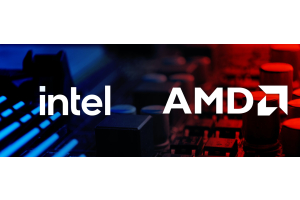We use cookies to offer you a better experience. For more information on how we use cookies you can read our Cookie and Privacy Policy.
What You Should Know About the Intel Core i9 Processor
November 22, 2018

The Intel® Core i9 is one of the most powerful Intel processors on the mainstream market. It’s faster and smarter than existing CPUs because of its expanded multi-threading capacity and better power efficiency.
It’s an optimal processor for your motherboard if you’re trying to assemble a great gaming rig, or if you dabble in programs that require a wealth of computing power. For example, it’s great if you do a lot of photo editing, digital video editing, music production, or digital animation, just to name a few.
The i9 has two models. The first is the 8th Generation i9-8950HK, which is already on the market. The second model, just released on October 19, is the 9th Generation i9-9900K.
Is the Intel Core i9 right for you? If so, which model should you choose? Read on to answer your questions about the latest processors from Intel.
What does the Intel Core i9 have that other processors don’t?
A processor’s main purpose is to read instructions, known as threads, and perform their dictated actions. The i9 CPU features Intel Hyper-Threading technology. This enables each core to process two threads simultaneously for a speedier performance.
Now consider the fact that the 9th Generation i9 has eight cores, with two threads allocated to each core; the i9 can process 16 threads at once. That’s a ton of processing speed, and is why the core is great for gaming. It can handle the abundance of threads for lightning-fast game-play.
The Intel Turbo Boost Technology is another speed-related enhancement in the i9. If the core isn’t too hot, it’ll increase the processor’s clock frequency by 200 MHz. You’ll get a temporary speed boost, but you won’t have to worry about the processor overheating because the turbo feature will end once the core reaches a certain temperature.
Another great feature of the i9 - especially for techies - is that it comes with an unlocked CPU.
This means that the processor can be overclocked; in other words, you can make it process information at a faster rate than what it was designed for. Not only does this make your computer more customizable, but it could also give you additional processing power to handle intensive applications - as if multi-core hyper-threading and turbo boosts weren’t enough. This isn’t multitasking; it’s mega-tasking.
But there’s more: the integrated Intel Optane® memory delivers even more speed.
Of course, all these speed enhancements would be useless if the Core i9 didn’t have a strong graphics card. But don’t worry, it does. The Core i9 features Intel Ultra High-Definition (UHD) Graphics. This graphics card is capable of playing 4K video, and it’s powerful enough to handle professional video and photo editing applications.
The graphics card isn’t the strongest that Intel has produced, but, supported by all the integrated speed boosts in the Core i9, it can handle any video game that features massive open world environments, or rich and immersive virtual reality (VR) experiences.
What is Intel Optane memory?
Intel Optane memory accelerates your computer’s responsiveness by remembering which documents, applications, and videos you use most frequently.
It’s basically the augmentation of RAM. All computers use Random Access Memory, which memorizes your recent computer activities - but only until the computer powers off.
Intel Optane, on the contrary, remembers your activities even after you shut off the computer. It stores that data in an area that’s physically closer to the processor, so they’ll be transferred to the core for processing in faster time - twice as fast as average speeds.
What’s the difference between the 8th Generation and 9th Generation Core i9?
The i9-8950HK is an 8th Generation Core, while the i9-9900K is a 9th Generation Core. Both models feature smart technology like Intel Hyper-Threading, Intel Turbo Boost, and Intel Optane memory, and they’re both unlocked CPUs.
The 8th Generation Intel i9 processor was built primarily for use with mobile servers, while the 9th Generation Core i9 is built primarily with desktops in mind. For that reason, there’s more muscle on the new i9.
Here are the main differences:
8th Generation
- 12MB cache
- 6 cores and 12 threads
- Speeds up to 4.80 GHz
9th Generation
- 16MB cache
- 8 cores and 16 threads
- Speeds up to 5.0 GHz
- Base frequency 1.7 GHz faster than the 8th Generation
- Can generate 50.0 W more of heat than 8th Generation
Both are extremely capable processors. You should invest in the 8th Generation i9 if you’re upgrading a laptop. You should invest in the 9th Generation i9 if you’re upgrading a desktop computer.
Would I like Intel’s other existing processors?
The previous 8th Generation of Intel processors - aside from the 8th Generation Core i9 - include the Intel Core i3, Core i5, and Core i7 laptops. The 8th Generation Cores are fast and smart, equipped with the very same Intel Turbo Boost technology and hyper-threading that the i9 has.
None of these processors, however, have the 8 cores and 16 threads that the i9 has. The Core i9 comes with more muscle, and so it’ll work better for you if you’re a hardcore gamer or creative professional.
Which HP laptops will have Intel Core i9?
Looking for an i9 laptop? These HP ZBook laptop workstations will be outfitted with the 8th Generation Intel Core i9 processors:
- HP ZBook Studio x360 convertible laptops
- HP ZBook Studio workstation laptops
- HP ZBook 15-inch mobile workstations
- HP ZBook 17-inch mobile workstations
HP® has also announced Z Club, which will be a subscription-based service that’s aimed to help creative professionals upgrade their hardware.
Why will HP laptops benefit from Intel Core i9 processors?
The HP ZBook series was designed for creative professionals: digital and fine artists, digital video editors, photo editors, music producers, and animators. Many of these creative applications dig deep into a computer’s memory and graphics subsystems, and they require the core to process a number of complex tasks simultaneously.
The Intel i9, with its overclocking capabilities, UHD graphics card, and stability-centric speed boosts, will further enhance the HP ZBook’s ability to process intensive creative applications.
Related articles:
- HP Workstations: A Complete Review
- HP ZBook Studio Workstations: A Complete Review
About the Author: Zach Cabading is a contributing writer for HP® Tech Takes. Zach is a content creation specialist based in Southern California, and creates a variety of content for the tech industry.






